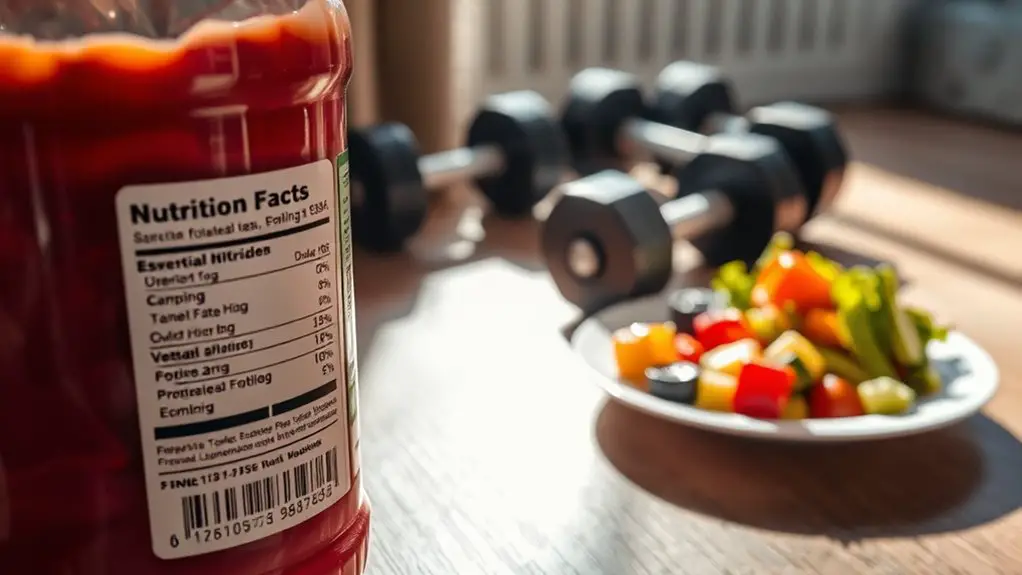Top 5 Mistakes That Prevent Muscle Gains

If you’re looking to maximize your muscle gains, watch out for these common mistakes. Neglecting proper nutrition, inconsistency in your training regimen, and overtraining can all hinder progress. Don’t forget to prioritize progressive overload by gradually increasing weights and guarantee you maintain proper form during exercises to prevent injuries. Making these adjustments can dramatically boost your results. There’s more to discover about optimizing your gains, so keep exploring!
Neglecting Proper Nutrition

When you’re focused on building muscle, neglecting proper nutrition can seriously hinder your progress. It’s not just about lifting weights; what you eat plays a vital role too. Meal timing is essential; fueling your body with the right nutrients before and after your workouts can optimize recovery and growth. Aim for nutrient-dense foods that provide the vitamins and minerals necessary for muscle repair. Incorporating lean proteins, healthy fats, and complex carbohydrates will help you meet your goals effectively.
Don’t skip meals or rely on empty calories; these habits can derail your efforts and lead to unwanted weight gain. Instead, plan your meals around your training schedule to guarantee your body has the energy it needs. By focusing on both meal timing and nutrient density, you’ll set yourself up for success and keep your body safe while pursuing those muscle gains.
Inconsistent Training Regimen
Proper nutrition and a consistent training regimen go hand in hand for muscle building. If you’re skipping workouts or not sticking to a schedule, you’re likely hindering your progress. A consistent training frequency helps your muscles adapt and grow stronger over time. Aim for regular sessions, whether it’s three, four, or five times a week, but make sure to listen to your body.
Incorporating workout variety is also essential. Doing the same exercises repeatedly can lead to plateaus and boredom. By mixing up your routine, you’ll engage different muscle groups and keep your workouts interesting. This not only benefits muscle growth but reduces the risk of injury, as varied movements help prevent overuse.
Overtraining and Insufficient Recovery

Though pushing yourself in the gym is important, overtraining can sabotage your muscle gain and lead to fatigue or injury. It’s essential to balance your training intensity with adequate rest days. Neglecting recovery can hinder your progress and even result in burnout. Skipping the gym for two weeks can lead to increased body fat and decreased energy levels, which further emphasizes the importance of recovery.
To help you understand the importance of recovery, consider this table:
| Training Intensity | Recommended Rest Days | Effects of Overtraining |
|---|---|---|
| Low | 1-2 | Minimal fatigue |
| Moderate | 2-3 | Increased risk of injury |
| High | 3-5 | Permanent muscle loss |
Make sure you’re listening to your body. If you’re feeling constantly tired or sore, take those rest days seriously. Prioritizing recovery will keep you safe and promote long-term muscle gains. Remember, growth happens during rest, not just in the gym!
Ignoring Progressive Overload
If you’re not incorporating progressive overload into your workouts, you’re likely stalling your muscle gains. Progressive overload is essential for promoting strength adaptation and ensuring your muscles continue to grow. Without it, your progress can plateau, leaving you frustrated. Here are some safe ways to implement progressive resistance in your training:
- Increase weights gradually: Add small increments to your lifts to challenge your muscles.
- Increase repetitions: Aim for more reps with the same weight to boost endurance.
- Change exercise variations: Switch to different exercises that target the same muscle groups.
- Reduce rest time: Shorten your rest periods to increase intensity and challenge your muscles.
- Improve training volume: Add more sets to your routine for greater stimulus.
Lack of Proper Form and Technique

Progressive overload is important, but it won’t do much good without proper form and technique. When you lift weights, improper alignment can lead to injuries and hinder your progress. Focus on mastering each movement through technique analysis to guarantee you’re getting the most out of your workouts while staying safe. Skipping rope can help enhance knee stability and improve your overall form if incorporated correctly into your fitness routine.
| Key Element | Importance | Tips for Improvement |
|---|---|---|
| Proper Alignment | Reduces injury risk | Use mirrors or a trainer |
| Controlled Movement | Enhances muscle engagement | Slow down your reps |
| Full Range of Motion | Maximizes muscle activation | Stretch before and after |
Frequently Asked Questions
How Important Is Hydration for Muscle Growth?
Hydration’s essential for your muscle growth. When you’re well-hydrated, your body functions better, which means improved performance during workouts and enhanced muscle recovery afterward. Dehydration can lead to fatigue and cramps, hindering your progress. It’s not just about drinking water; your overall hydration importance extends to electrolyte balance as well. So, make sure you’re sipping throughout the day to support your gains and keep your muscles feeling their best.
Can Supplements Really Help With Muscle Gains?
Supplements can be like the secret sauce in your muscle-building recipe. They can enhance your progress but aren’t magic. Protein timing matters; consuming protein around your workouts can maximize gains. As for supplement types, options like whey protein or creatine can be beneficial, but it’s vital to choose high-quality products. Always consult a healthcare professional to guarantee safety, because your health should come first on this journey to strength.
How Often Should I Change My Workout Routine?
You should consider changing your workout routine every 4 to 6 weeks. This routine variation helps prevent plateaus and keeps your workouts engaging. However, make certain you’re monitoring your workout frequency; too much change too soon can lead to injury. Listen to your body and adjust based on how you feel. Consistency is key, so guarantee you’re also allowing adequate recovery time between sessions for peak muscle growth and safety.
What Role Do Genetics Play in Muscle Building?
Genetics play a significant role in muscle building, influencing your genetic predisposition to gain muscle mass. Everyone’s muscle fiber composition is different; some may have a higher percentage of fast-twitch fibers, which are more suited for strength and hypertrophy. While you can’t change your genetics, you can maximize your potential through consistent training and proper nutrition. Understanding these factors can help you set realistic goals and stay safe while pursuing your fitness journey.
Is Cardio Detrimental to Muscle Growth?
Cardio isn’t inherently detrimental to muscle growth, but it depends on the types and timing of your workouts. If you’re doing long, intense cardio sessions before strength training, it might hinder your performance. Instead, consider shorter, moderate cardio sessions after your weightlifting, so you don’t fatigue your muscles beforehand. Balancing both can enhance your overall fitness without sacrificing muscle gains. Just listen to your body and adjust accordingly!





